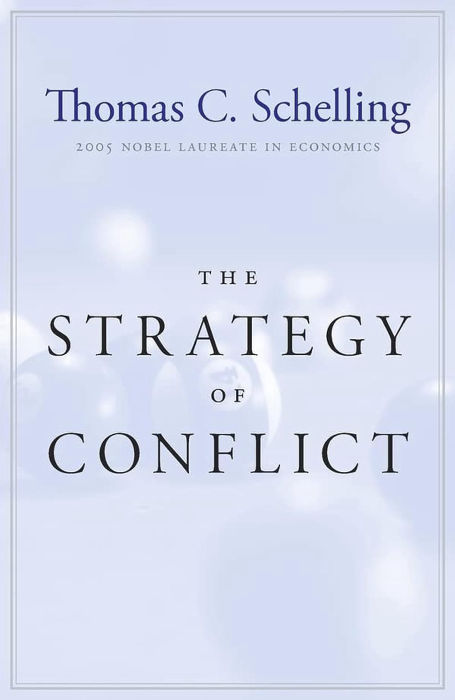Books
Thomas C. Schelling
The Strategy of Conflict
Thomas C. Schelling’s The Strategy of Conflict revolutionized how we understand international disagreements, negotiation, and deterrence by applying game theory to real-world conflict. Schelling’s insights—often counterintuitive—show that sometimes, limiting your own options or making threats that are only partly credible can be powerful tools in both diplomacy and war. With clarity and wit, he reveals how rational actors can exploit uncertainty, communication, and commitment to shape outcomes in situations where interests both clash and overlap. This classic remains foundational for anyone interested in the logic behind conflict and cooperation in global politics.
Schelling’s book is a series of interrelated essays that explore how adversaries, from states to individuals, navigate situations where they share some interests but also face deep conflicts—such as negotiations, war, deterrence, and even extortion. He argues that traditional analyses of conflict, which focus solely on brute force or zero-sum outcomes, miss the subtleties of real-world bargaining. Instead, Schelling introduces concepts like “focal points” (Schelling points), which help parties coordinate without direct communication, and the paradoxical power of self-imposed constraints: for example, visibly reducing your own options can force the other side’s hand, as in the famous “throwing the steering wheel out the window” scenario.
One of Schelling’s most influential ideas is that the threat of retaliation can be more effective when it is uncertain rather than guaranteed, making deterrence more credible and efficient. He also explores the role of communication—both explicit and tacit—in shaping expectations and outcomes, and how strategic commitments can alter the bargaining landscape. Through logical thought experiments and real-world examples, Schelling demonstrates that the art of conflict is often about shaping perceptions and manipulating risk, rather than simply overpowering an opponent.
The Strategy of Conflict is celebrated for its lucid, engaging style and its profound influence on fields ranging from political science to economics and military strategy. Schelling’s work not only advanced game theory but also provided practical tools for understanding nuclear deterrence, arms control, and crisis management during the Cold War and beyond. The book’s enduring relevance lies in its ability to explain why credible threats, limited war, and even apparent weakness can be strategic assets. For students, policymakers, and anyone interested in the dynamics of negotiation and power, Schelling’s insights remain as vital today as when they were first published.

